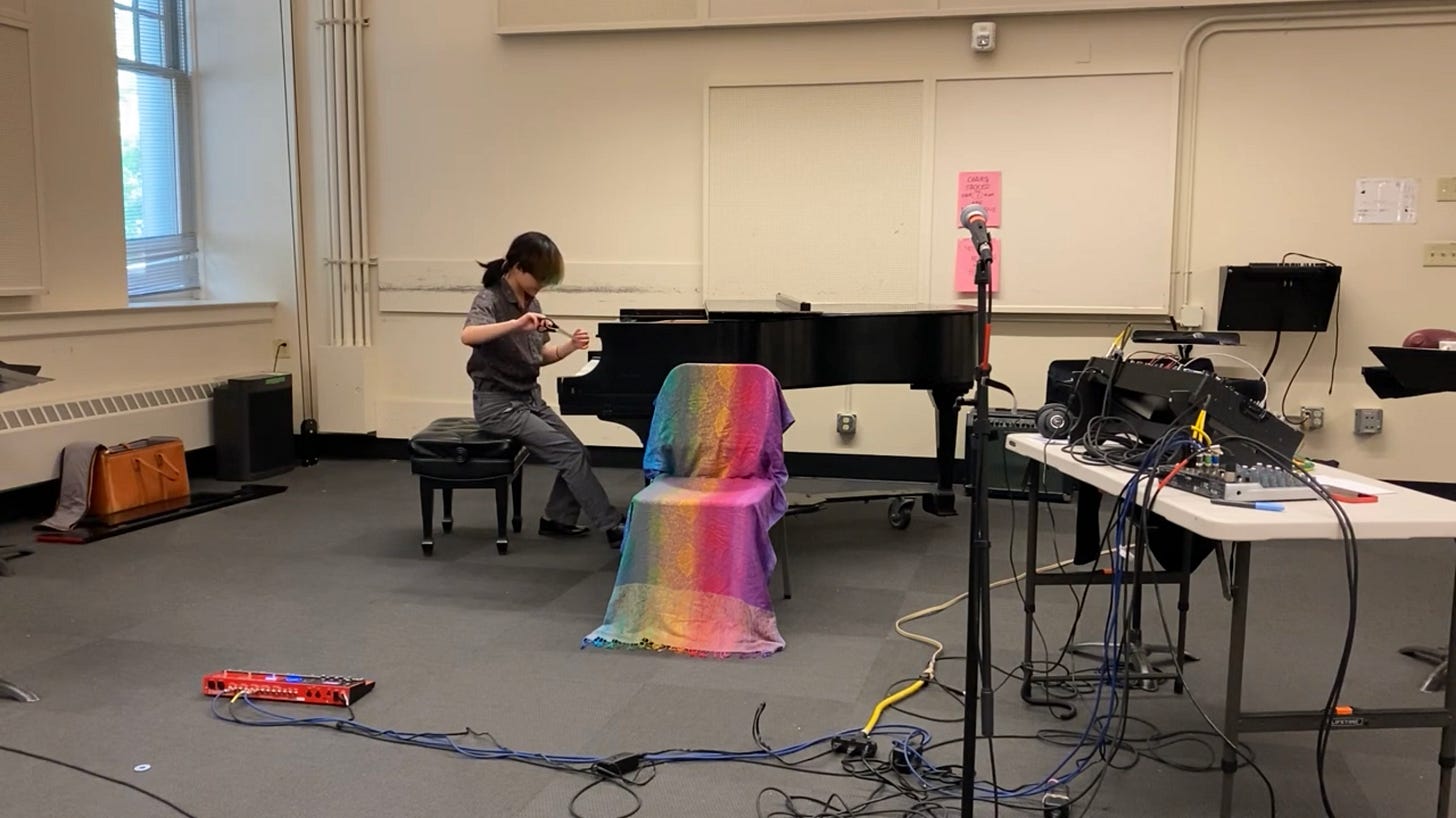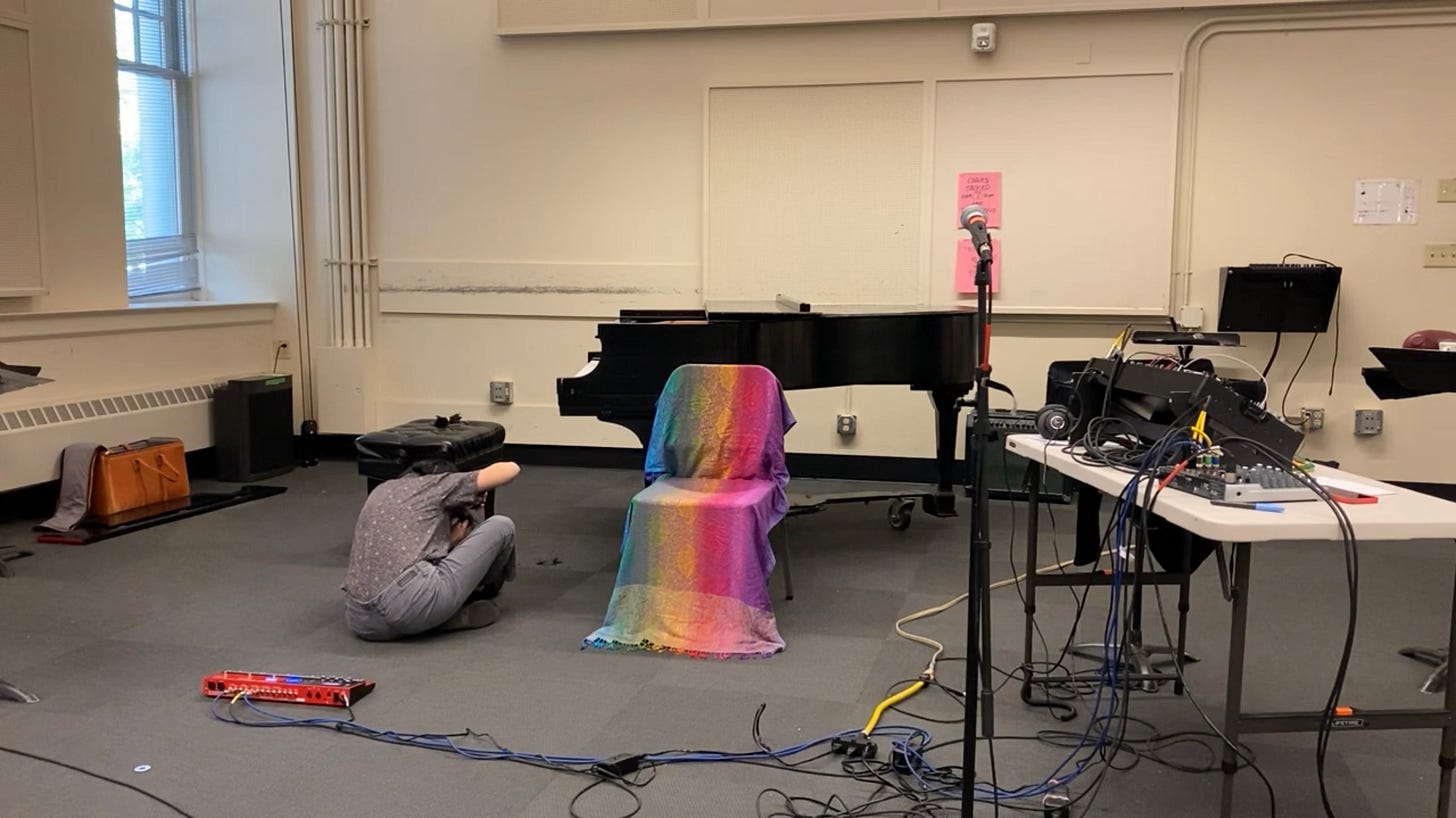A Performance Reimagined: On “fluxing, quivering, transforming”
How a mishap at an airport spurred my interdisciplinary creativity and brought out new meanings in my performance.
Content warnings: descriptions of intense psychological states, references to struggling with gender identity
As part of my music senior thesis project, I composed a piano solo and performed it in my senior thesis recital. The piece, fluxing, quivering, transforming, narrates my intertwined journeys of gender identity and mental health, placing them in the context of my Chinese heritage. It begins, like an ordinary piano work, on the keyboard, but later involves vocalizations, playing on the piano strings using large Chinese calligraphy brushes, and an improvisation upon a tarot card selected prior to performance. Because of how deeply personal the narrative is, the piece can only be performed by me: my body becomes part of the performance.

You can read more about the work as originally written here and watch a recording of the premiere here. I got to perform the work a second time when I was a Composition Fellow at Nief-Norf Summer Festival in early June. Later that month, from June 21st-24th, I was to perform it again at New Music Gathering in Portland, Oregon. But an unexpected sequence of events forced the performance to transform, symbolizing even more strongly the metamorphosis of self that I have undergone and continue to pursue.
Here is my story.
Travel Troubles
I arrived at the Philadelphia International Airport that Wednesday later than I intended, due to my mother having mistakenly driven us to the Arrivals parking lot rather than the Departures area and having difficulty correcting the mistake. So I entered Terminal D already feeling irritated and anxious, only to find that the queues for bag checks at my airline were extraordinarily long. On a screen above the escalators was the wait time for TSA: 4-6 minutes for PreCheck, which I did not have; 13-18 minutes for everyone else. As I needed to get in line to check my luggage, I began to worry that I would miss my flight. Some staff started instructing those who were on my flight to move to a different queue for expedited luggage checks, but that queue was still slow.
The crowdedness of the terminal, combined with my worries and my sleep deprivation, soon nauseated me. By the time it was my turn to check my bag, I felt very dizzy. After I gave my luggage to the staff member, I immediately sat down on the ground. The staff member asked me if something was wrong. I explained that I was feeling dizzy and just needed to sit for a bit. That staff member then had another staff person come over, who asked me if I needed a paramedic. I said no, since I was fairly sure that it was just a symptom of panic and that I would recover after a brief rest. So I was taken to a side of the room where there was a bench with a security officer standing nearby. I sat down on the bench, and a staff member gave me a cup of water to drink.
As I was afraid both of missing my flight and of the security officer deciding to call the paramedics (or worse, 911), I only rested a few minutes before entering the also very long queue to go through TSA. At TSA, I got yelled at for saying “What?” in confusion after the officer told me to keep my shoes on, which only distressed me more. When I finally got to my assigned gate, the flight had already started boarding. Gladly, I boarded the plane and emotionally readied myself for the flight. I flew first to Atlanta, Georgia and then caught a second flight to my destination of Portland, Oregon.
When I arrived in Portland, I felt reinvigorated from my nap on my longer second flight and excited to spend the day exploring the city with my West Coast friend who had also come to visit. But when I went to retrieve my luggage at the baggage claim, I realized something was off. First I realized that I didn’t have a receipt for my checked luggage. Still I waited several minutes for my bag to show up, even quickly checking the contents of a similar-looking bag to see if it was mine, but I couldn’t find it. I then went to the help desk to ask what was going on.
It turned out that when I got dizzy in the Philly airport, the staff member abandoned the process of checking my bag, such that when they later realized they had a bag that wasn’t checked, they weren’t sure if it was mine. So they tried to call my cell phone multiple times before my flight took off, but since noise-sensitive me does not turn on the ringer on their phone unless they are expecting a call, and at the time they tried to call me I was likely either going through TSA or rushing to the gate worried that I’d miss my flight, I never noticed the calls.
Not having your luggage is an inconvenience for anyone, but it wasn’t just a matter of having no extra clothes. I was missing some items that I needed for my performance: two extra-large Chinese calligraphy brushes (used to brush the piano strings) and the Next World Tarot deck by Cristy C. Road (the prompt for musical improvisation). They were carefully selected for my performance for particular symbolic reasons and could not be easily substituted.
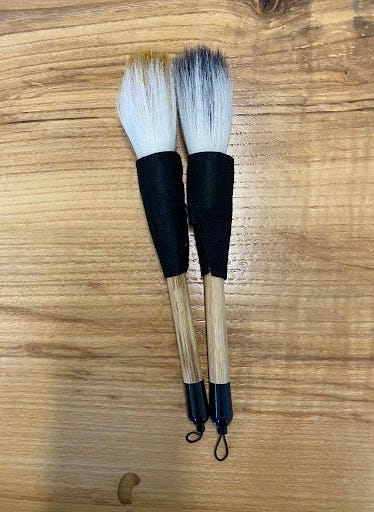
Since I was to attend Splice Institute the week after NMG in Kalamazoo, Michigan, I tried to have my luggage shipped overnight from the airport to where I was staying in Portland. But somehow there was a problem with the shipment, and Fedex never picked it up. I ended up having my mother pick up the bag from the airport instead, just to make sure I wouldn’t lose it. My performance was on Friday evening, so I had some time to figure out what to do, but I was really distressed.
The NMG organizers, especially Lainie Fefferman (who is an awesome human being and fellow maths-lover), were super kind and helpful with my situation. They even emailed their mailing list to ask if anyone had similar items or knew where to obtain them in Portland. Some people offered suggestions, but nothing was exactly right, so it looked like I was going to have to settle for second-best. Until I met Tis, a trans non-binary vocalist (and many other things) with a fantastic sense of fashion.
Tis observed that an intriguing absurdity in my situation that echoed the crisis of identity that my performance was narrating. The piece tightly interwove my Chinese, Mad, and Queer identities in a deeply personal and intersectional story of feeling lost in searching for myself -- yet it was precisely those elements that were now, concretely, lost! An instance of Madness in an airport led to my losing a symbol of Chineseness and gender-creative agency and a oracle of Queer, Disabled becoming. The cards have spoken, Tis told me. Rather than resort to second-best replacements for intentional creative choices, I needed to respond to this absurd situation with a spirit of improvisation.
So…I decided to cut my hair. During the performance. Originally the idea was to use the hair like brushes on the piano strings, but the NMG organizers dissuaded me from that idea, since they needed to obtain permission for everything done inside of the pianos at the university. Thus I just planned to cut my hair and brush it on the exterior of the piano, letting myself improvise in the moment. I took a course in performance art in my last semester of college, so I had some basic training in creating live action art and felt confident that I could make the hair-cutting work. I borrowed some scissors from my queer Airbnb host, grabbed a gradient rainbow scarf that I happened to have brought, and prepared myself emotionally to perform.
The Performance
The concert was a more informal one, in a rehearsal room rather than an auditorium. I was first on the program, so while audience members trickled in, I dwelt in the makeshift “stage” area. Lainie briefly introduced the concert, and then I went up to the mic to speak. I shared a little about the mishaps at the airport and my decision to try something new in the performance, but I didn’t say what because I wanted to surprise the audience. My shoulder-length hair was rubber-banded into pigtails, a highly uncharacteristic hairstyle for me that feels like what so many Chinese mothers give their young daughters to make them look like cute Chinese dolls. The scissors were hidden inside of the piano, ready for me to take out at the right moment.
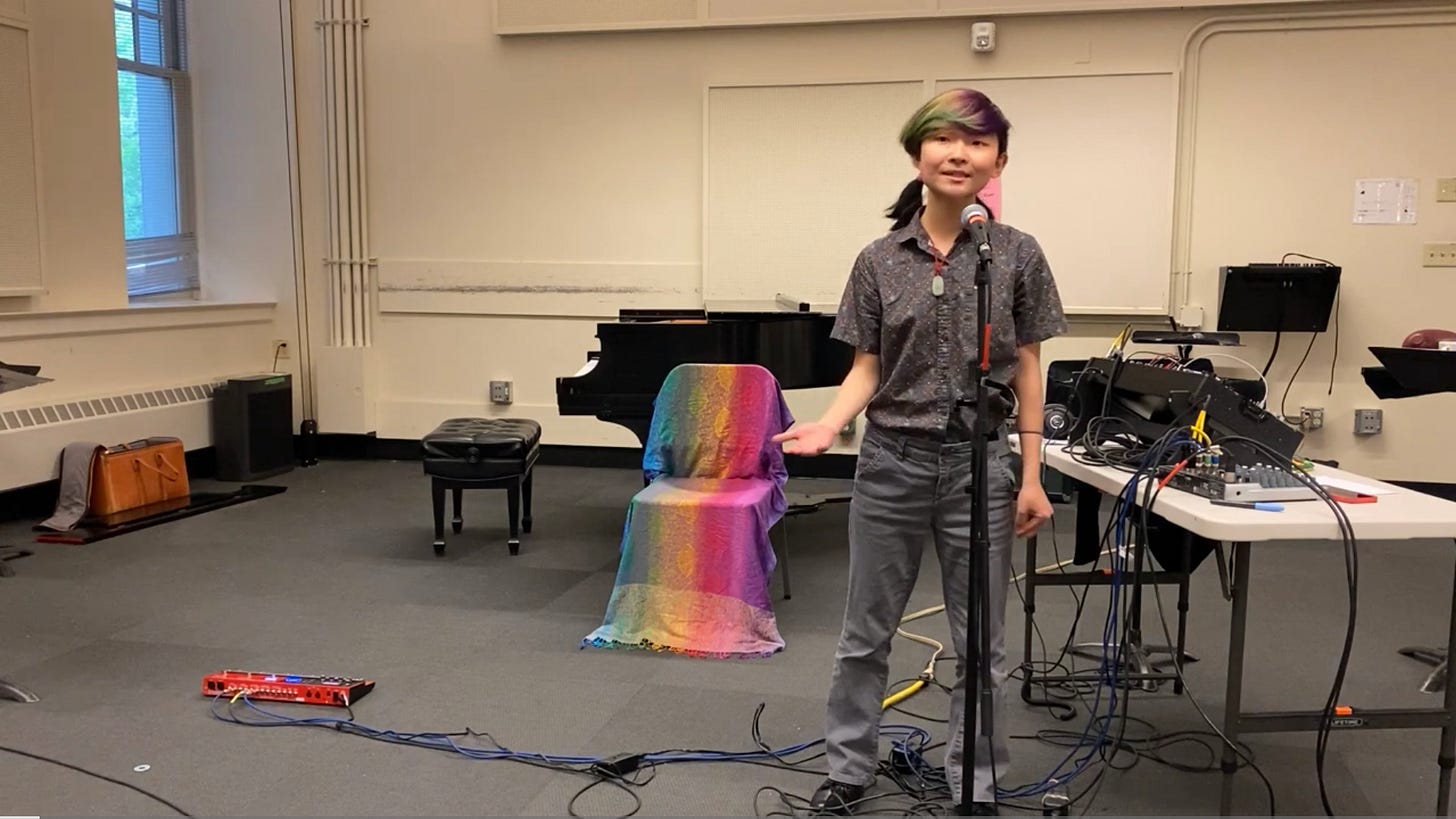
Then I began with a poem, originally a part of my program note, but which I later decided to make an oral introduction:
fluxing: inherent fluidity of being. many things within me oscillate over time: gender, mood, passions, desires. waxing and waning, yin flowing into yang flowing into yin.
quivering: once shivering with fervent spirit, now vacillating with anxious uncertainty. my bodymind loses its balance; the vertigo spins me sick. to where have i travelled? how do i find my way -- forward? back? elsewhere?
transforming: what does it mean to be forever in transit? never stationed in one place, always in the process of becoming myself.
I then sat down at the piano and started the piece as usual by playing on the keyboard. My fingers felt hard to control; I hadn’t warmed up much, so that was probably part of it, but it seemed primarily to be my nerves. I kept missing notes and felt mildly frustrated and distressed.
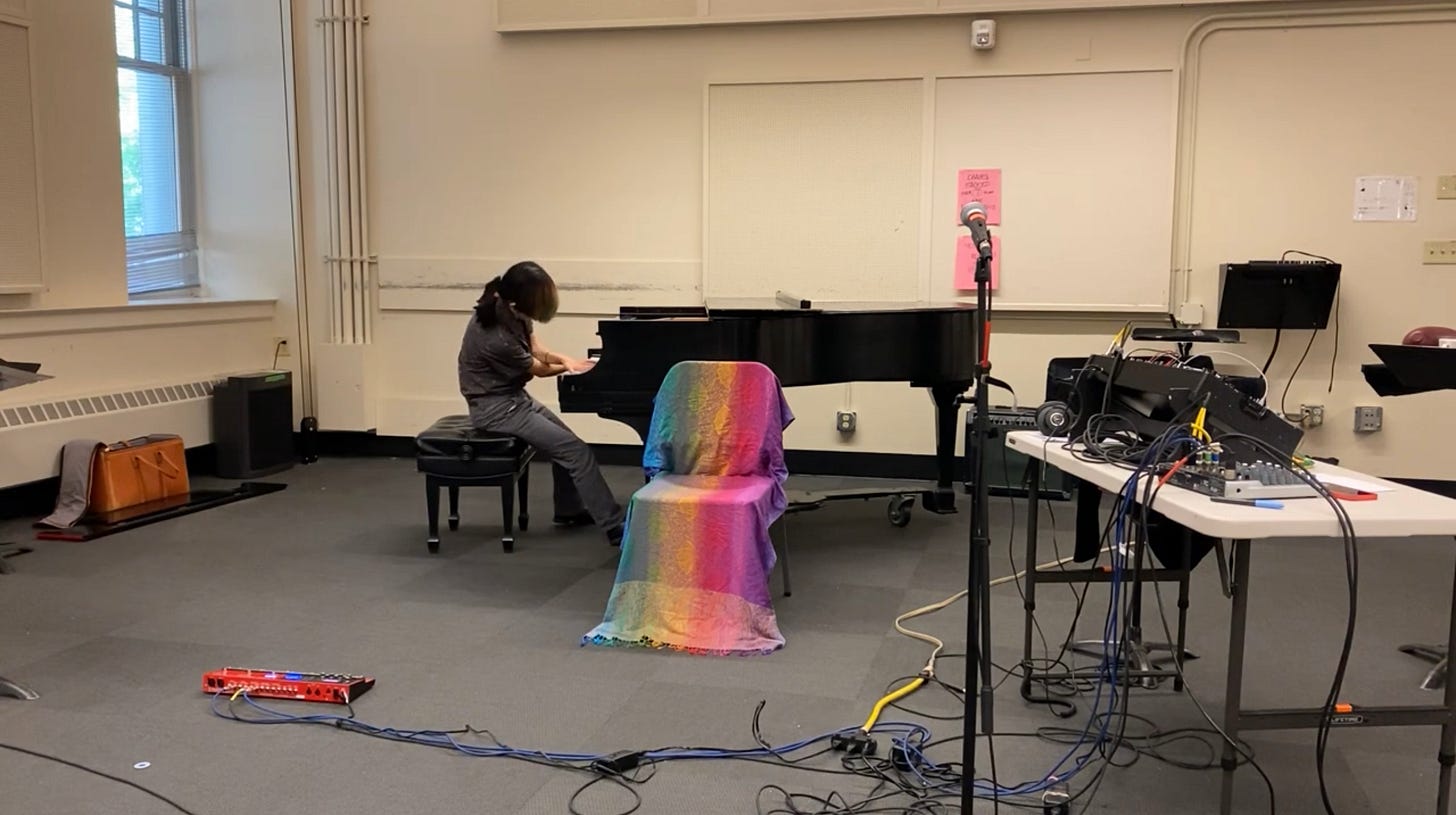
My playing gradually intensified and then deteriorated, evoking a sense of crisis. I began to speak:
Bao bei, little girl, are you okay?
Bao bei, little girl, where are you?
Normally after that would be the section where I brush the piano strings while making calming breath sounds like “shhhh” and “tssssss.” This time, after I took some deep, audible breaths, I grabbed the scissors that I had hidden in the piano. I played around with them, gliding them over the keyboard.
Then, I began to snip at one of my pigtails. It was much harder than I thought it would be. Ugh! Cut through! What am I to do?
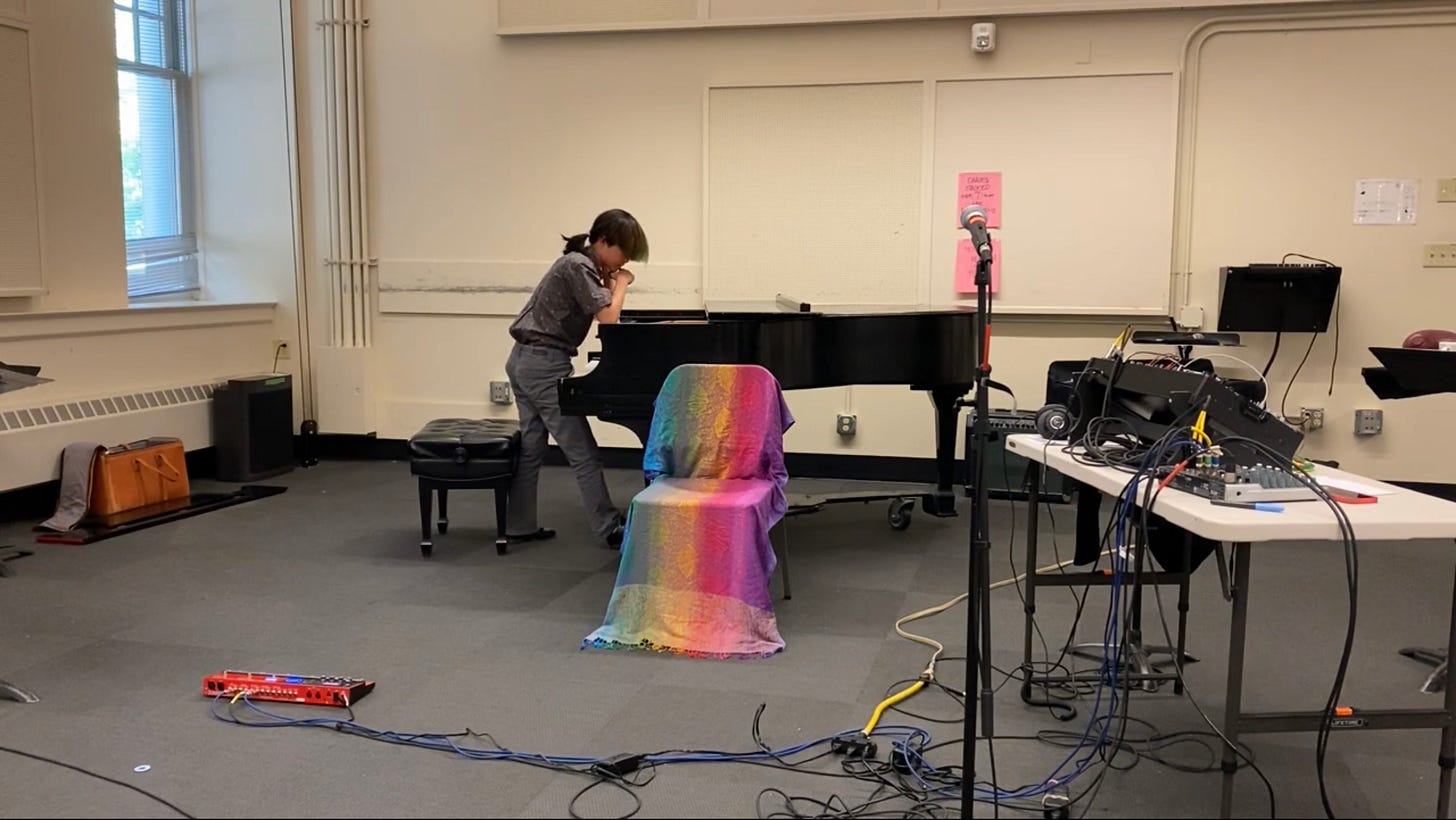
I was terrified, but I continued to improvise. You wanted this, you wanted this, I whispered aloud to myself. I don’t know what I’m doing! I exclaimed. The terror at having a performance go awry merged with the panic I felt years ago at having my boldly created queer self crack and later crumble. When I finally cut the pigtail off, I let myself feel the shock. What have I done? Who am I becoming? A performance artist? A shapeshifter? A composer — of life?
I ended up leaving the piano bench at one point, crouching on the ground. You wanted this you wanted this you wanted this. I still felt like I had no idea what I was doing, but I was in it.
After cutting off the second pigtail, I took off the rubber bands that kept the hairs together and let them fall upon the gradient rainbow scarf, which I had spread on a chair beside the piano.

Eventually I made my way back to the keyboard. Whatever I was doing, it was time to bring it to a close. I am...I am, therefore, I am. Words that in my original performance were a confident declaration of being now were more difficult to articulate, more difficult to believe in. I then played the conclusion as I had originally written, but feeling shaky with every note.
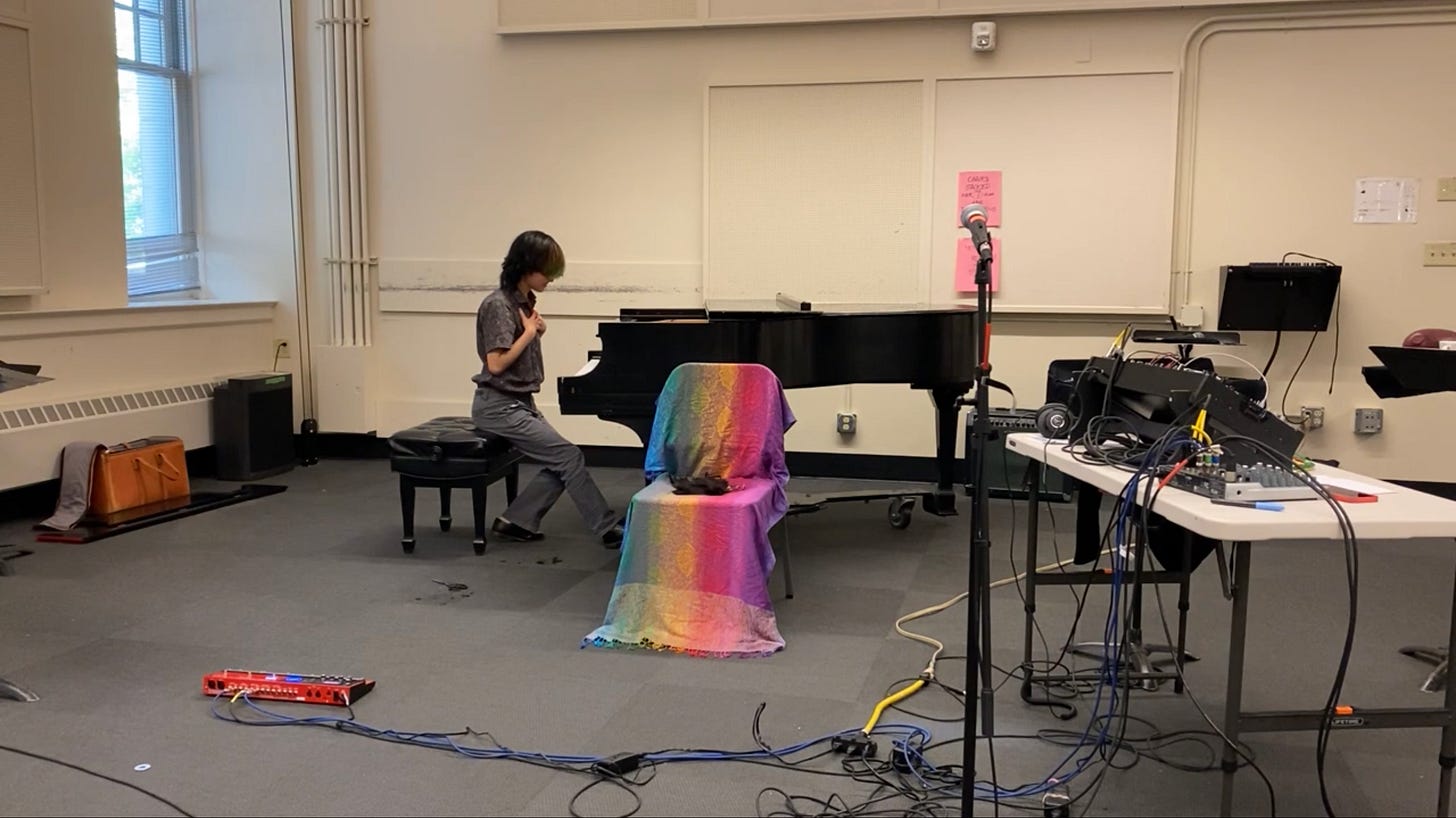
The audience applauded, and I felt drained. I often feel more palpably anxious after a performance than I do before or during, and in my nervousness I ignored the audience and started picking up hair that had fallen on the ground. Then I stood up, wrapped the rainbow scarf around the pile of hair, and hugged the bundle while repeatedly saying “thank you” to the audience, sobbing.
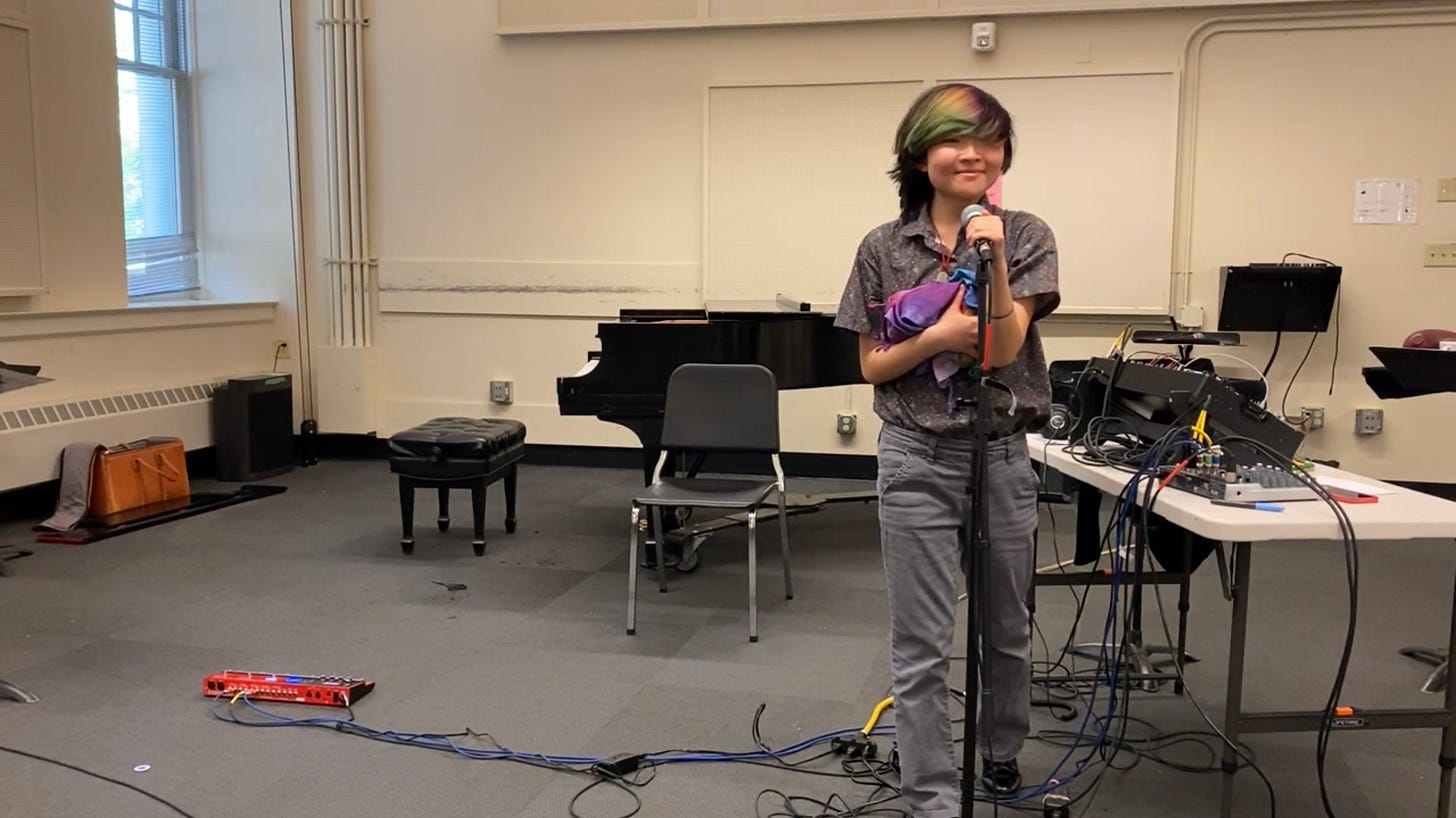
The Aftermath
My original performance was under 15 minutes long; this one lasted nearly 25. The difficulty in cutting off my hair forced me to go much slower than I had intended. Lainie told the audience that there would be a 5-minute break. She checked in with me, and saw me crying. We embraced, and it felt calming for a moment.
I exited the room, finding a few people waiting outside. Some of them had come late and listened to the performance behind the closed door. Some of those who did watch inside gave me congrats. One of them was Tis. Tis encouraged me to go outside to the quiet, serene place where I first met them and convene with the trees and birds. I did, but I struggled to calm down. I felt intensely agitated and could not sit still.
My mind harshly criticized me about my performance, in particular telling me that I should have brought out my femininity more, because my gender identity is complex and not everyone sees that. I wanted to grieve my hair, but I didn’t manage to do so as much as I wanted, and I was upset at myself for that. To fight the self-criticism, I belted out musical theater songs that I had been working on in vocal lessons — “Astonishing” from Little Women, “Loser Dumplings” from Interstate, anything to get me into a different character and momentarily forget myself.
I don’t remember all the details of what happened next, but basically, for the next few hours, my psychological state oscillated between extremes. Sometimes I was underresponsive, finding myself unable to speak or even to look away from a bright light that I vaguely knew would usually bother me. Sometimes I was physically discombobulated and emotionally hysterical, feeling restless but having difficulty maneuvering and laughing uncontrollably about the situation.
When I am in such extreme states, it can be really difficult to discern whether I need to be alone or to be in the presence of others, because either could be beneficial or triggering depending on what is going on for me in a particular moment — and in the next moment, that could change greatly. Luckily, there were a few people who were volunteering for NMG who offered to support me, so I went back and forth between spending time alone and hanging out where they were gathering.
After a little while, I realized that these extreme states mirrored the psychological turmoil that I was in two years ago when I actively struggled with my gender identity. Even the criticism that my mind was screaming at me, that I should have been more “feminine” in my performance because that would have been more “authentic,” echoed the messages that my embattled mind told me years ago that I was “faking” being non-binary and was actually only a woman. My performance, being so powerfully raw, seemed to have triggered an emotional memory of crisis.
Once I realized that this was what was going on, it became a little easier to deal with the emotional intensity. I was familiar with these extreme states; I had survived them before, so I could survive them now. When one of the volunteers asked me what helped me when I was in such states, I was able to articulate what I thought I needed. That’s something I could not have done two years ago (or even perhaps one year ago). I had grown through crisis, and now I felt stronger.
About two hours after my performance, it became clear to me that I was not going to recover fully anytime soon. I did not want to keep the volunteers who were helping me from participating in NMG events, so I took an Uber back to my Airbnb and went to sleep relatively early.
It took me a full 24 hours to feel at least physically recovered from the performance. Unfortunately, I had also gotten sick with a cold, likely from all the stress and travel, so I was quite worn down. On Saturday, at the suggestion of the NMG organizers, I went to a free mental health urgent care clinic, primarily to get a short-term prescription of my psych meds, since those were also in my left-behind luggage. (Note to self: Put your important things in your personal item/carry-on!)
This meant that I skipped out on a lot of scheduled activities that day, but that was okay, because my health was more important. I did manage to arrive just in time for the final concert, where I got to see headliner (and keynote speaker) Caroline Shaw perform on multiple instruments including voice.
The next day, I flew to Michigan for Splice Institute, a weeklong program of workshops on electronic music. I had looked forward to Splice, but after everything that happened at NMG, I was really burnt out. Plus I had a bad cold and later terrible menstrual pain, so terrible that I relied upon the kindness of a random Western Michigan University student to accompany me to the health center. I ended up missing a lot of the workshops and resting a lot in my dorm room, which I felt bad about, but eventually I started to feel more compassionate towards myself. I had just survived a lot, and there was much to learn from my experience.
Post-Performance Reflection
Looking back on my performance, it feels like the piece was supposed to transform in this way all along: to become more fully a work of live, embodied performance. Fate just intervened to let it happen.
My original version of fluxing and the new version complement each other to tell a fuller version of my story than either could tell alone. In the original piece, it is never specified how I answered the question of who I am, or even if I arrived at a particular answer; it is only clear from the statement, “I am, therefore I am” and the relatively settled ending that I found some sense of emotional closure. In the new version, it is clear that I am moving away from femininity through the cutting of my hair, but I never seem to feel completely at ease about this. I attempt to say “I am, therefore I am” multiple times before feeling able to conclude, and the musical ending sounds more unsure.
Both of these narratives are true to my journey, yet each is incomplete on its own. The emotionally settled version is more retrospective, looking back from the present to the past, reflecting upon the progress I have made thus far. The more distraught version rather expresses vividly how the past is, to some degree, always present: the self-doubt and emotional memory of crisis can be brought to the forefront long after the conscious elements of myself have sufficiently “moved on.”
If I had more time to plan out my performance, I could have prepared better, by obtaining sharper scissors and perhaps securing permission to brush the hair on the piano strings (the performance did leave a bit of a mess of hair, but almost all of it was from the cutting, not from brushing the rubber-banded hair around), but also by creating contingency plans for what to do if something went awry. But the nature of this performative act was that I couldn’t fully prepare or rehearse; it was necessarily an experiment, done live in front of the audience.
More importantly though, it was precisely the uncertainty of how things would play out that provided a way for me to embody the confusion and terror that I felt in my crisis of identity. In this sense, the performance went perfectly because it didn’t go as expected: first because of the lost brushes and tarot cards, and then because of the unexpected difficulty in cutting my hair. Just like my initially bold coming-out as non-binary did not go as expected: it was actually months after that when my mind started to distrust itself and break down, because although part of me was confident, another part had been freaking out all along.
I realized when speaking with someone who had watched my performance that one could easily impose a more conventional narrative upon it: the story, as perceived by someone only knowing me as transmasculine and not as the gender-complex being I am, could be misinterpreted as a more linear journey of eventually coming out. People in my audiences are always going to have their own perceptions of my performances, some of which I may disagree with, some of which might actually enrich my own understanding of my art. I can’t control what other people think; I can only perform as myself and let my art impact my audience and myself, hopefully for the better.
The next time I do performance art, especially when the subject is autobiographical, I will try to prepare ahead of time for the potential psychological repercussions of performance. This could include identifying someone who is able and willing to support me afterwards, making sure I have nourishing food and drink available (though I might not be able to eat for some while), preparing a bag of items that soothe my senses, and finding a place where I can expel excess physical energy without causing harm. Performance can be really intense and vulnerable and is a powerful way of expressing deeply personal experiences such as mental health struggles, but I need to avoid having the performance itself sending me into crisis.
Overall, although I am still harshly critical of myself when watching the recording, I am happy with how this performance turned out. The experience reminds me that I don’t have to firmly categorize my being: non-binary or “non-non-binary,” musician or poet or performance artist. Whatever I feel drawn to explore, I shall, with both enthusiasm and patience, caring for my various needs even when they seem to contradict. For the essence of self is change: fluxing, quivering, transforming.
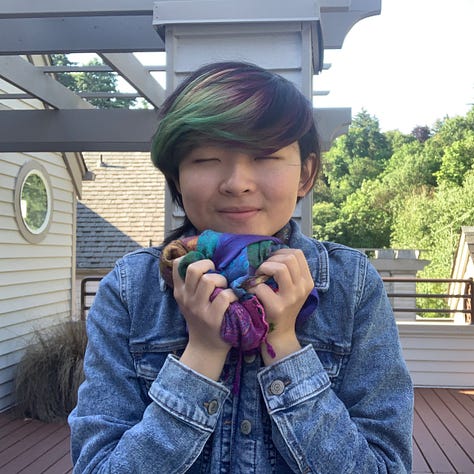
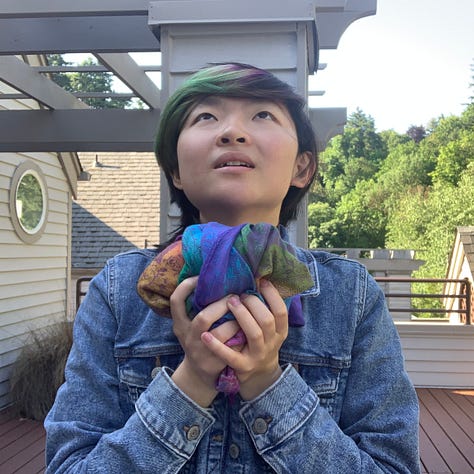
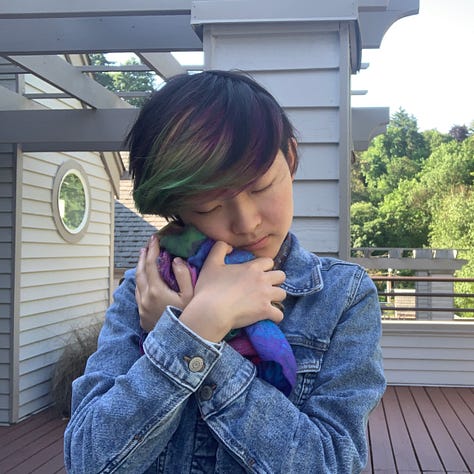
Right now I still have the bundle of hair inside the rainbow scarf. On my birthday next week (July 25th), I am going to perform a private hair-burning ritual, to allow myself to grieve. In the fire is forged a new me, as the phoenix is born out of the ashes. Through my tears I lovingly hold who I was and ready myself to welcome a new becoming. Symbolically this will be the completion of this stage of fluxing, quivering, transforming. What comes next, I cannot fully predict, but I’ll be in it.
To view the video recording of the performance at New Music Gathering, click here.





